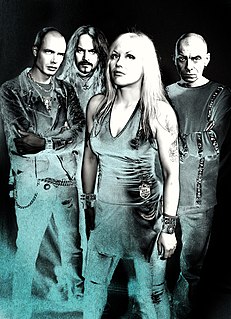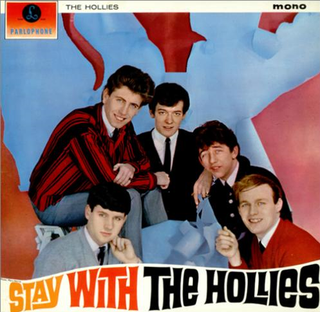
The Crickets were an American rock and roll band from Lubbock, Texas, formed by singer-songwriter Buddy Holly in the 1950s. Their first hit record, "That'll Be the Day", released in 1957, peaked at number three on the Billboard Top 100 chart on September 16. The sleeve of their first album, The "Chirping" Crickets, shows the band lineup at the time: Holly on lead vocals and lead guitar, Niki Sullivan on rhythm guitar, Jerry Allison on drums, and Joe B. Mauldin on bass. The Crickets helped set the template for subsequent rock bands, such as the Beatles, with their guitar-bass-drums lineup and the talent to write most of their own material. After Holly's death in 1959 the band continued to tour and record with other band members into the 21st century.

The Hollies are a British rock group formed in 1962. One of the leading British groups of the 1960s and into the mid 1970s, they are known for their distinctive three-part vocal harmony style. Allan Clarke and Graham Nash founded the band as a Merseybeat-type music group in Manchester, although some of the band members came from towns further north in East Lancashire. Graham Nash left the group in 1968 to form Crosby, Stills & Nash.

Face to Face is the fourth studio album by the English rock band The Kinks, released in October 1966. The album marked a shift from the hard-driving style of beat music that had catapulted the group to international acclaim in 1964. It is their first album consisting entirely of Ray Davies compositions, and has also been regarded by critics as rock’s first concept album. The album was included in Robert Christgau’s "Basic Record Library" of 1950s and 1960s recordings, published in Christgau's Record Guide: Rock Albums of the Seventies (1981).. The album was included in the book 1001 Albums You Must Hear Before You Die.

The Searchers were an English Merseybeat group who emerged during the British Invasion of the 1960s along with the Beatles, the Hollies, the Fourmost, the Merseybeats, the Swinging Blue Jeans, and Gerry and the Pacemakers.

"Not Fade Away" is a song credited to Buddy Holly and Norman Petty and first recorded by Holly and his band, the Crickets.

Vice Squad are an English punk rock band formed in 1979 in Bristol. The band was formed from two other local punk bands, The Contingent and TV Brakes. The songwriter and vocalist Beki Bondage was a founding member of the band. Although there was a period of time when the band had a different vocalist she reformed the band in 1997.
The Creation was an English rock band, formed in 1966. Their best-known songs are "Making Time", which was one of the first rock songs to feature a guitar played with a bow, and "Painter Man", which made the Top 40 in the UK Singles Chart in late 1966, and reached No. 8 in the German chart in April 1967. It was later covered by Boney M in 1979, and reached the No. 10 position in the UK chart. "Making Time" was used in the movie Rushmore.

In The Hollies Style is the second album by the British rock band the Hollies and was released in November 1964 on Parlophone Records. It missed the official Record Retailer album chart in the United Kingdom, which at the time only had a total of 20 available spots. In Canada, it was released on Capitol in October 1965, with an altered track listing.

Evolution is the first of two albums released in 1967 by British pop rock band the Hollies. The album peaked at number 13 in the UK album chart.

Cock Robin is an American pop rock band, mostly popular in the 1980s, particularly in continental Europe, where it achieved major success, notably with the single "The Promise You Made". The band was founded by singer-songwriter Peter Kingsbery in 1982, disbanded in 1990, and reformed in 2006.

Anthony Christopher Hicks is an English guitarist and singer who has been a member of the British pop group the Hollies since 1963, and as such was inducted into the Rock and Roll Hall of Fame in 2010.

Stay with The Hollies is the debut album by the British rock band the Hollies and was released in January 1964 on Parlophone Records. In Canada, it was released on Capitol in July 1964, with a different track listing. In the US, Imperial Records issued the album under the title Here I Go Again in June 1964 to capitalize on the moderate success of the singles "Here I Go Again" and "Just One Look". It also features covers of well-known R&B songs, not unusual for Beat groups of the day.
The Luvvers was a Scottish rock group. They are best known as the backing group to Lulu on her debut chart single, "Shout" (1964). They subsequently had a low-key career of their own before disbanding in March 1966.

The Shadows to the Fore was an EP by The Shadows, released in May 1961. The EP was released as a 7-inch vinyl record in mono with the catalogue number Columbia SEG 8094. The Shadows to the Fore was the UK number-one EP for 28 weeks, having three separate stints at the top of the chart from June 1961 until May 1962.

The Shadows is an EP by The Shadows, released in January 1961. The EP is a 7-inch vinyl record and released in mono with the catalogue number Columbia SEG 8061 and in stereo with the catalogue number Columbia ESG 7834. The Shadows was the UK number-one EP for 20 weeks, having two separate stints at the top of the chart from January to June 1961. The cover photograph was taken by Angus McBean. The original picture showed Cliff together with the Shadows, however the layout for the EP was adapted and Cliff was replaced by yellow triangles.

Just One Look is the title of the second EP by The Hollies. It was put out by Parlophone in mono with the catalogue number GEP 8911 and released in the UK in late June 1964. The EP entered the British charts on 27 June 1964 and peaked at #8 on the Record Retailer chart after ten weeks. All songs on this EP were previously released at the time. Side A consisted of the A and B-side to the band's "Just One Look" single released in February 1964. Side B contained two tracks from the band's debut album, Stay with the Hollies.

Here I Go Again is the title of the third EP by The Hollies. It was put out by Parlophone in mono with the catalogue number GEP 8915 and released in the UK in October 1964. All songs on this EP were previously released by the Hollies at the time. Side A consisted of covers of R&B songs, tracks from the band's debut album, Stay with the Hollies while the B-side contained both sides of the "Here I Go Again" single from May 1964.

Skinny Minnie is a 1958 song co-written and recorded by Bill Haley and his Comets. The song was released as a Decca single which became a Top 40 chart hit in the U.S.

Hollies' Greatest is the only number one album in the UK by British band the Hollies. It was released shortly before Graham Nash's departure from the Hollies and was intended to include all of their British hit singles with Nash, as well as filling in for the lack of an original LP by the group in 1968. Only 3 of the 14 songs on the album – "Stay", "I Can't Let Go" and "Stop! Stop! Stop!" had previously been released on U.K. albums.

In Style With the Crickets is an influential rock and roll album by the Crickets. Although it was the band's first release following the departure and subsequent death of their front man, Buddy Holly, it still contains many of the band's most memorable songs and many tracks have also been featured on numerous compilations over the years. Originally released as an LP record on December 5, 1960, the album remained out of print for some time until it was re-released on CD in 1993, with bonus tracks not featured on the original album.


















